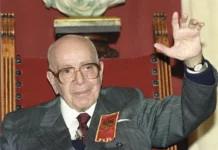In Communion, Our Lord Jesus Christ comes into contact with us in a very special way: soul to soul! As a loving Father and infinitely powerful Physician, He wants to forgive and heal us.
When I was a boy, children were asked, in catechism classes, if they believed that Our Lord Jesus Christ was really present in the Holy Eucharist. They were supposed to give an answer that still echoes in my memory today. It was very beautiful, like all the responses from the catechism: “I believe that He is present, Body, Blood, Soul and Divinity.”
In order to receive Holy Communion well, we must remember the following truth: We do not see Our Lord Jesus Christ, but He is present in the Blessed Eucharist as He was in the House of Nazareth, in Bethany – with Martha and Mary – in the sacred arms of the Blessed Virgin or on the Cross.
And in Communion, this same Jesus enters within us.
“Caro Christi, caro Mariæ”
What is the power of the presence of our Lord Jesus Christ in us when we receive Communion?
Let us imagine Our Lord in the immaculate and most pure womb of the Virgin Mary. Being God, from the very first moment of His Incarnation He possessed intelligence, maintained a direct, sublime and unfathomable communication with the Blessed Trinity, and continually received the worship of His Mother, who knew that the Redeemer was present within Her.

During the months of gestation, Our Lady transmitted to Him elements for the constitution of His Body, and made increasingly greater acts of adoration and love, because She was aware of the process which He was undergoing. The Sacred Flesh and Blood of Jesus were the immaculate flesh and blood of Mary Most Holy.
“Caro Christi, caro Mariæ,” the theologians say: the Flesh of Jesus Christ is the flesh of Mary. The physical presence of Our Lord in the immaculate womb of the Blessed Virgin was so intimate that it established as it were an interpenetration of souls, just as there was an interpenetration of bodies. And this made His presence extraordinarily fruitful in sustaining even more that luminous and crystalline peak of holiness which was Our Lady.
Jesus Christ present within us
Through the analogy with the presence of Our Lord Jesus Christ in the womb of the Blessed Virgin, we can then understand the Eucharistic presence within us.
Our Lord enters into us and, as long as the Sacred Species remain within us without being corrupted by the process of digestion, He has an effect upon our whole being. And as we are composed of body and soul, He mysteriously enters into sanctifying contact with our soul. This is the extraordinary beatitude that each one of us receives at the moment of Communion!
In order to understand this action of Our Lord upon us during Communion, let us recall a very beautiful fact, narrated by the Gospel.

As Jesus walked along, a sick woman who wished to be healed, seeing the Divine Master surrounded by that a dense crowd trying to hear and see Him or to be freed from some illness, approached from behind and touched His sacred tunic. At that moment Jesus turned and asked, “Who touched Me?” The Gospel says that He felt power had gone forth from Him and passed on to someone else (cf. Mk 5:25-30).
In other words, He perceived that a force – in this case, of course, it was a vital force – had left Him and was transmitted to that woman who had been healed. Now, if a person with faith, touching His tunic, could be healed, what does it mean to receive Him entirely within us? It is a grace that cannot be fathomed.
Soul-to-soul contact
Imagine a person who goes to someone else’s house every day to talk. If the visitor is someone distinguished, noble, eminent or holy, he will honour that house. However, much more important than that will be the soul-to-soul relationship established between the two. In conversation, something of the talent, nobility, excellence, virtues or holiness of the visitor’s soul is communicated to the host.
To an immensely greater degree, Holy Communion transmits these goods to us, because Our Lord has a much more intimate relationship with us than a visitor to our house. Entering into our body and having this contact of soul is like interpenetration.
The Gospel tells us about the various attitudes of Our Lord. Those that touch me most are of two kinds. One is when He addresses the Eternal Father: His words are so beautiful, so humble. He is God, but also Man. And if we saw a man like us praying to the Father in that way, with that humility and, at the same time, with that intimacy, we would feel ourselves inserted into that beam of light, almost carried into the interior of the Most Holy Trinity.
For me, the prayers of Our Lord are more beautiful than His sermons and all that He did. It is natural, because speaking to the Eternal Father He would say more beautiful things than to men – to whom He made such admirable revelations that by the end of the world we will not have finished studying them.
Let us suppose, in addition to praying, that He looked at and addressed words to Our Lady – for me, this is the second most touching attitude. The last glance of the Redeemer at Her from the height of the Cross, what a wonderful thing! We will never understand the splendour of this exchange of gazes!
It is necessary, therefore, to consider who we are about to receive and the immense honour, the incalculable benefit granted to us by Him who thus enters into us and deigns to establish such a union with us.
Loving visit
We should not only have the feeling of honour, but also of goodness. Our Lord, in the Holy Eucharist, remains alone for hours and hours, locked up in a tabernacle, isolated, in a chapel where only the lamp of the Blessed Sacrament burns. Many times, people pass in front of the church and no one stops to pray. And He is there, waiting for someone who wishes to receive Communion. The Redeemer, then, gives Himself to anyone, enters his body and makes contact with his soul to do him good.

St. Peter said of Our Lord this phrase which I find very beautiful, of astonishing simplicity and depth: “Pertransivit benefaciendo – He went about doing good” (Acts 10:38). Wherever He went, the most sinful people were received with goodness. Thus, during Communion we must have the confidence that He is not a severe Judge, but a loving Father and an infinitely powerful Doctor, eager to forgive us.
“My Mother, prepare me to receive Communion”
Before receiving Holy Communion, we should bear these considerations in mind in order to receive the Blessed Sacrament worthily.
Those who prepare themselves for Communion in union with Her, asking Her for the necessary graces, will act in keeping with the condition of a slave of Our Lady, according to the spirituality of St. Louis-Marie Grignion de Montfort.
This is how I prepare myself, saying to the Blessed Virgin: “My Mother, prepare me for this Communion, placing in my soul every good disposition, every good thought, every good impetus, so that I may be conscious of the immense honour I will receive. Because You have prayed, your Son will come to me.”
In union with Our Lady, everything is obtained.
Taken, with minor adaptations, from:
Dr. Plinio. São Paulo. Year XIII.
N.144 (Mar., 2010); p.16-18
The Supreme Devotion

Eucharistic piety occupied the primary place in Dr. Plinio’s spirituality. The secret of this indefatigable fighter of the Holy Church was to be found in the Blessed Sacrament and on the beads of the Rosary.
Those who never had the opportunity to accompany Dr. Plinio as he approached the tabernacle or the monstrance could not say that they truly knew his love for Our Lord Jesus Christ. At these moments, invariably, his supernatural sensitivity was deeply touched by the Eucharistic presence.
In this regard, he commented in the 1990s, as he left one of the houses of his work, where he had participated in the opening of the Forty Hours’ Adoration: “We look at Him, and He, as it were, looks at us. It is beyond doubt that we feel we are seen by the Blessed Sacrament and we have the impression that He says, ‘I am here and therefore fear nothing, because everything will be resolved. I am King and I can do anything, I want everything for your good, and I will arrange everything as long as you have confidence in Me.’ That is how I interpret the presence of the Blessed Sacrament. It has a beauty, a blessing! It is a silence that speaks, something simply wonderful, incomparable!”
When entering churches or chapels where the Blessed Sacrament was exposed, after bowing profoundly, Dr. Plinio would take a seat and immediately fix his gaze on the Sacred Host, remaining absorbed in prayer to the point of hardly blinking. In those circumstances, when it was necessary to give him an urgent message, or to ask him a brief question, he would, with a sign, ask those around him to wait a few moments. Only then would he listen, without turning his head or even taking his eyes off the monstrance, and he would respond in the same position, in a low voice and with just a few words.
Once, when asked about this attitude, in which the relationship of intimacy with Our Lord in the Blessed Sacrament seemed to be even more sensible than at the time of Communion itself, Dr. Plinio confirmed: he did not remember even once having approached the Blessed Sacrament to adore Him, without experiencing an irresistible attraction.
Such was Dr. Plinio’s sensibility to the Eucharistic that he came to possess a true intuition of the proximity of the Blessed Sacrament, which was often witnessed in his car trips. When he passed in front of churches, he was able to say whether or not Our Lord was present there in the Blessed Sacrament, and in the affirmative case he would remove his hat as a sign of respect.
The enormous respect shown by Dr. Plinio to the Eucharist was also reflected in certain details concerning the care he took when preparing for Communion – the sacred moment, the central point and the apex of his day.
Even the time chosen for Communion was part of these habits: it was after his siesta, at the end of the period dedicated to prayer, a moment in which he felt in the best possible state of mind. In fact, he himself stated that the preparation for the solemn act of Communion began from the time of awakening in the morning, and the recollection of it extended throughout the remaining hours of the day. In this regard, he commented: “Such a serious action as that of receiving Our Lord Jesus Christ into our souls should mark the whole day for us, in the manner of our First Communion, whose remembrance should not diminish with time, but grow.”
Adoration of the Holy Eucharist was Dr. Plinio’s supreme devotion.
Taken, with minor adaptations, from: CLÁ DIAS, EP, João Scognamiglio.
O dom de sabedoria na mente, vida e obra de [The Gift of Wisdom in the Mind, Life and Work of] Plinio Corrêa de Oliveira.
Città del Vaticano-São Paulo: LEV; Lumen Sapientiæ, 2016, v.V, p.300-315







